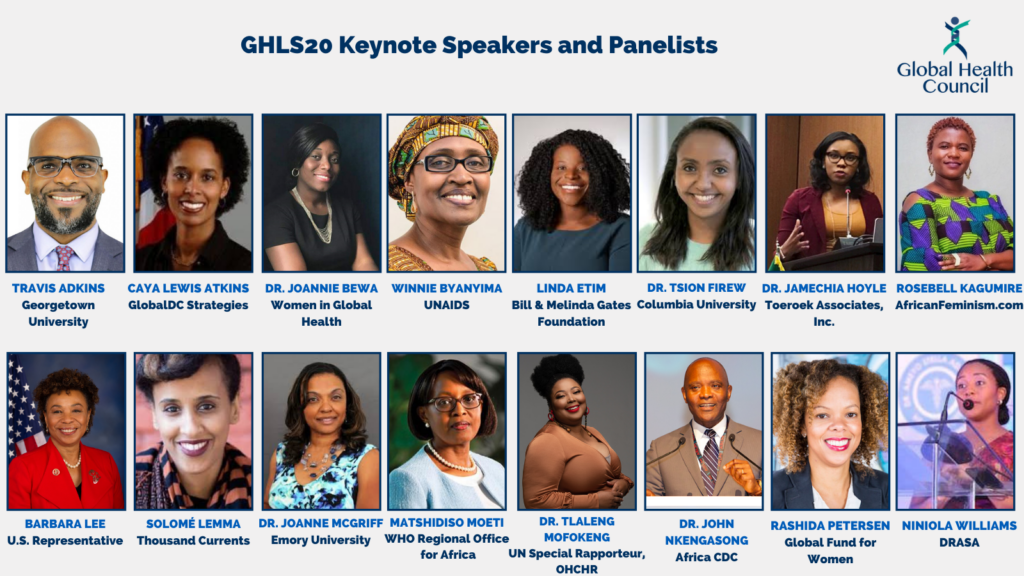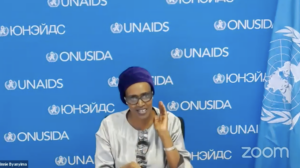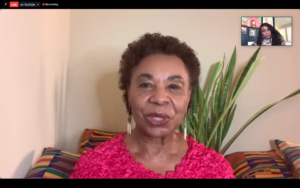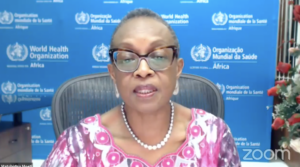Pandemics, Politics, & Privilege: Key Takeaways from GHC’s Summit

“As a global health organization, fighting a pandemic has been all-consuming and life-changing for a lot of us. 2020 has been fraught with news of racial injustices, global inequities, and a volatile political climate. We felt that it was critically important that we have one, whole conversation with a number of these things in mind, recognizing the overlap between them.”
– Loyce Pace, President & Executive Director, Global Health Council
Global Health Council hosted its annual Summit on November 19-20. In perfect 2020 form, the convening was held virtually with attendees logging in from locations across the globe, from Lagos to Dhaka to Washington, DC.
It was an opportunity not only to hear from prominent global health leaders, but also to have long-awaited conversations with one another. The timely agenda covered inequality and systemic racism, the lessons we are learning from COVID-19, support for the World Health Organization (WHO), and what the recent U.S. election means for global health.
Though more details will be shared in the coming weeks, we wanted to provide a quick snapshot of recurring themes from the conversation:
The global health community was urged to take active steps to combat systemic racism.

Winnie Byanima, Executive Director, UNAIDS speaking at GHLS20
“To be anti-racist is to say: let’s look at everything—the systems, the structures, the policies, the rules, who is at the table—and examine them for racial equality. You challenge everything.”
– Winnie Byanima, Executive Director, UNAIDS
Steps we are encouraged to take include, among other things:
- Making indigenous ownership and leadership the standard—not the exception;
- Compensating local partners in the Global South at the same rate as their Northern counterparts;
- Questioning what is happening in our own organizations, including rethinking who we choose to hire, promote, and elevate as experts;
- Sitting in our discomfort and making the space for change.

Rep. Barbara Lee speaking at GHLS20
“We’ve seen inadequate healthcare systems that have been discriminatory, leading to disparities which have led to immoral rates of transmission and deaths of black and brown and marginalized people throughout the world.”
– U.S. Congresswoman, Barbara Lee
COVID-19 has exposed further inequity in global health. But, it has also provided an opportunity for wealthy nations to learn from countries in the Global South that have had more success fighting the pandemic.
- High-income countries safeguarded medical supplies, such as personal protective equipment and tests, making it harder for low- and middle-income countries to fight the pandemic.
- The media narrative that low-income countries would weather the crisis poorly has been largely proven false.
- Many middle- and low-income countries have outperformed the U.S. on the pandemic with compelling examples of:
-
- Collaborations between health and other sectors;
- Health care workers effectively advocating for support;
- Mobilization of private-sector resources;
- Leveraging existing systems built for other national health issues, such as HIV and Ebola, to combat the pandemic.
- COVID-19 presents challenges to progress against other diseases. UNAIDS Executive Director, Winnie Byanima said that, though it has been more difficult in her sector, partly due to HIV services being appropriated for the pandemic response, she has been inspired by stories of community members coming together to ensure HIV-positive neighbors get treatment.
“Populations who experienced novel viruses before were a bit more prepared, mentally, to deal with this. Countries that have dealt with SARS or MERS or Ebola knew who to turn to in those moments, and the U.S. missed out on a lot of those things.”
– GHC member
There was unanimous support for WHO and efforts to depoliticize the multilateral organization by:
- Strengthening and empowering it, while simultaneously shoring up national and regional public health institutions;
- “Building a fence” to shield it from the politics ;
- Combatting efforts to sidestep multilateral global health organizations.
“Creating parallel structures or new workarounds to deeply tested and tried institutions and relationships isn’t particularly wise.”
– Caya Lewis Atkins, Global DC Strategies
There was a call for the incoming U.S. administration to increase U.S. investment in global health. Suggestions included:
- Doubling U.S. investments in global health over the next five years;
- Increasing domestic U.S. health resources to fight COVID-19 at home, including emergency supplemental funding;
- Proper capacity and staffing at government agencies that have been understaffed throughout the Trump administration.
“Something that’s foundational to everything we do is resources… but U.S. investment has only increased by 9% over the last decade.”
– GHC member
As the discussion closed, panelists shared their hopes for 2021 and beyond, namely: U.S. reengagement with the global health community, progress towards universal health coverage, more focus on multilateralism, amplifying the voices of the most historically marginalized populations, and the successful rollout of a COVID-19 vaccine. All in all, we walked away with a deeper commitment to shifting power dynamics and structural barriers in pursuit of health for all, worldwide.

Matshidiso Moeti, Regional Director for Africa, WHO speaking at GHLS20
“The COVID-19 pandemic has confirmed that we need to address inequities to achieve sustainable goals in health and development. We now need to walk the talk with global solidarity.”
– Matshidiso Moeti, Regional Director for Africa, WHO
Full event summary to follow in the next few weeks!